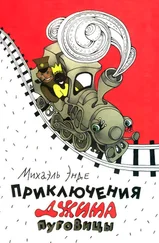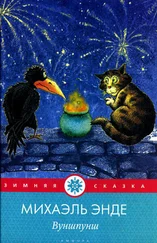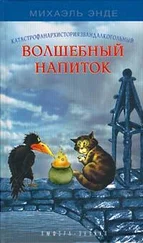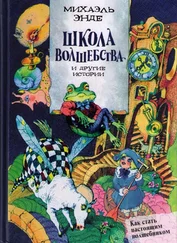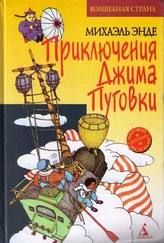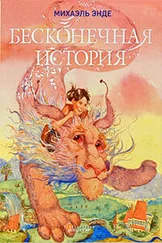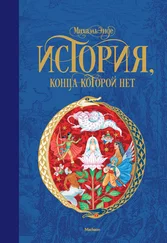It passed through his mind that the rest of them down in the classroom would be having history just then. Maybe they’d be writing a composition on some deadly dull subject.
Bastian looked at the book.
“I wonder,” he said to himself, “what’s in a book while it’s closed. Oh, I know it’s full of letters printed on paper, but all the same, something must be happening, because as soon as I open it, there’s a whole story with people I don’t know yet and all kinds of adventures and deeds and battles. And sometimes there are storms at sea, or it takes you to strange cities and countries. All those things are somehow shut up in a book. Of course you have to read it to find out. But it’s already there, that’s the funny thing. I just wish I knew how it could be.”
Suddenly an almost festive mood came over him.
He settled himself, picked up the book, opened it to the first page, and began to read
The Neverending Story

 ll the beasts in Howling Forest were safe in their caves, nests, and burrows.
ll the beasts in Howling Forest were safe in their caves, nests, and burrows.
It was midnight, the storm wind was whistling through the tops of the great ancient trees. The towering trunks creaked and groaned.
Suddenly a faint light came zigzagging through the woods, stopped here and there, trembling fitfully, flew up into the air, rested on a branch, and a moment later hurried on. It was a glittering sphere about the size of a child’s ball; it moved in long leaps, touched the ground now and then, then bounded up again. But it wasn’t a ball.
It was a will-o’-the-wisp. It had lost its way. And that’s something quite unusual even in Fantastica, because ordinarily will-o’-the-wisps make others lose their way.
Inside this ball of light there was a small, exceedingly active figure, which ran and jumped with all its might. It was neither male nor female, for such distinctions don’t exist among will-o’-the-wisps. In its right hand it carried a tiny white flag, which glittered behind it. That meant it was either a messenger or a flag-of-truce bearer.
You’d think it would have bumped into a tree, leaping like that in the darkness, but there was no danger of that, for will-o’-the-wisps are incredibly nimble and can change directions in the middle of a leap. That explains the zigzagging, but in a general sort of way it moved in a definite direction.
Up to the moment when it came to a jutting crag and started back in a fright.
Whimpering like a puppy, it sat down on the fork of a tree and pondered awhile before venturing out and cautiously looking around the crag.
Up ahead it saw a clearing in the woods, and there in the light of a campfire sat three figures of different sizes and shapes. A giant, who looked as if the whole of him were made of gray stone, lay stretched out on his belly. He was almost ten feet long. Propped up on one elbow, he was looking into the fire. In his weather-beaten stone face, which seemed strangely small in comparison with his powerful shoulders, his teeth stood out like a row of steel chisels. The will-o’-the-wisp recognized him as belonging to the family of rock chewers. These were creatures who lived in a mountain range inconceivably far from Howling Forest—but they not only lived in the mountain range, they also lived on it, for little by little they were eating it up. Rocks were their only food. Luckily a little went a long way. They could live for weeks and months on a single bite of this—for them—extremely nutritious fare. There weren’t very many rock chewers, and besides it was a large mountain range. But since these giants had been there a long time—they lived to a greater age than most of the inhabitants of Fantastica—those mountains had come, over the years, to look very strange—like an enormous Swiss cheese, full of holes and grottoes. And that is why they were known as the Cheesiewheezies.
But the rock chewers not only fed on stone, they made everything they needed out of it: furniture, hats, shoes, tools, even cuckoo clocks. So it was not surprising that the vehicle of this particular giant, which was now leaning against a tree behind him, was a sort of bicycle made entirely of this material, with two wheels that looked like enormous millstones. On the whole, it suggested a steamroller with pedals.
The second figure, who was sitting to the right of the first, was a little night-hob.
No more than twice the size of the will-o’-the-wisp, he looked like a pitch-black, furry caterpillar sitting up. He had little pink hands, with which he gestured violently as he spoke, and below his tousled black hair two big round eyes glowed like moons in what was presumably his face.
Since there were night-hobs of all shapes and sizes in every part of Fantastica, it was hard to tell by the sight of him whether this one had come from far or near. But one could guess that he was traveling, because the usual mount of the night-hobs, a large bat, wrapped in its wings like a closed umbrella, was hanging head-down from a nearby branch.
It took the will-o’-the-wisp some time to discover the third person on the left side of the fire, for he was so small as to be scarcely discernible from that distance. He was one of the tinies, a delicately built little fellow in a bright-colored suit and a top hat.
The will-o’-the-wisp knew next to nothing about tinies. But it had once heard that these people built whole cities in the branches of trees and that the houses were connected by stairways, rope ladders, and ramps. But the tinies lived in an entirely different part of the boundless Fantastican Empire, even farther away than the rock chewers. Which made it all the more amazing that the mount which had evidently carried the tiny all this way was, of all things, a snail. Its pink shell was surmounted by a gleaming silver saddle, and its bridle, as well as the reins fastened to its feelers, glittered like silver threads.
The will-o’-the-wisp couldn’t get over it that three such different creatures should be sitting there so peacefully, for harmony between different species was by no means the rule in Fantastica. Battles and wars were frequent, and certain of the species had been known to feud for hundreds of years. Moreover, not all the inhabitants of Fantastica were good and honorable, there were also thieving, wicked, and cruel ones. The will-o’-the-wisp itself belonged to a family that was hardly reputed for truthfulness or reliability.
After observing the scene in the firelight for some time, the will-o’-the-wisp noticed that each of the three had something white, either a flag or a white scarf worn across his chest. Which meant that they were messengers or flag-of-truce bearers, and that of course accounted for the peaceful atmosphere.
Could they be traveling on the same business as the will-o’-the-wisp?
What they were saying couldn’t be heard from a distance because of the howling wind in the treetops. But since they respected one another as messengers, mightn’t they recognize the will-o’-the-wisp in the same capacity and refrain from harming him? It had to ask someone the way, and there seemed little likelihood of finding a better opportunity at this hour in the middle of the woods. So plucking up courage, it ventured out of its hiding place and hovered trembling in mid-air, waving its white flag.
The rock chewer, whose face was turned in that direction, was first to notice the will-o’-the-wisp.
“Lots of traffic around here tonight,” he crackled. “Here comes another one.”
Читать дальше
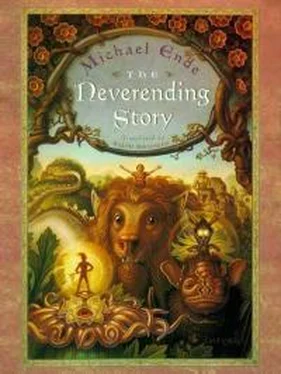

 ll the beasts in Howling Forest were safe in their caves, nests, and burrows.
ll the beasts in Howling Forest were safe in their caves, nests, and burrows.
